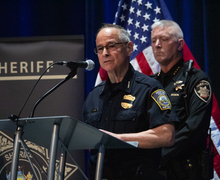This senior was once denied permission to start an LGBTQ club. So she transferred to SU.
Prince Dudley | Staff Photographer
Jestina Ortega has been involved with La L.U.C.H.A. and S.A.S.S.E. since transferring to Syracuse University as a sophomore.
Bridging the gap between the communities she cares about has been Jestina Ortega’s mission since transferring to Syracuse University her sophomore year.
Ortega, a senior women’s and gender studies and psychology dual major, spent her freshman year at the University of Scranton. She transferred after being turned off by the lack of diversity. Her tipping point was when she wanted to start an LGBTQ club but was denied. School officials explained it “didn’t align with the university’s values.”
Since she started at SU, Ortega has been a part of Latinx Undergraduates Creating History in America — La LUCHA for short — which raises awareness for Latinx-based culture. She’s also a member of Students Advancing Sexual Safety and Empowerment (SASSE), which advocates for sexual safety and empowerment and co-hosts Hora Latina, a Latino radio show with WERW.
“I’m just so grateful for this campus for having these spaces for different groups of people,” Ortega said.
Her involvement in such organizations has allowed her to show how different identities don’t have to be viewed as separate from each other. Two years ago, as secretary of La LUCHA, Ortega was part of creating the inaugural “Cafe con Soul Food” banquet which highlighted the Afro-Latino community while bring together black and Latino communities on campus.
“Being Latino, the secret within the Latino community is that we are also black and we have black in us, and we have very similar cultures, even being an American Latino person or an American black person,” Ortega said.
The banquet has since become an annual event, and it gained so much popularity that this year it became an invitation-only affair.
In her senior year, Ortega has slowed down with her involvement in student organizations and shifted her time to academics. After graduation, she plans to attend graduate school for social psychology.
“There is not enough representation of marginalized people within the mental health field both as professionals and as patients,” Ortega said.
The attitude toward it, specifically, within the black and Latino community is to pray it away or dismiss it as something they can easily get over.
“It’s usually family members so we don’t have a good network, or maybe they just don’t understand the medical or clinical reasoning for all of this,” Ortega said. “They usually just say, ‘pray about it,’ and make it a religious thing instead of something to seek help for.”
Though all generations are important, Ortega said, she plans to focus on bringing awareness to youths.
Published on April 16, 2017 at 8:09 pm
Contact Stacy: sfern100@syr.edu | @StacyFernandezB




